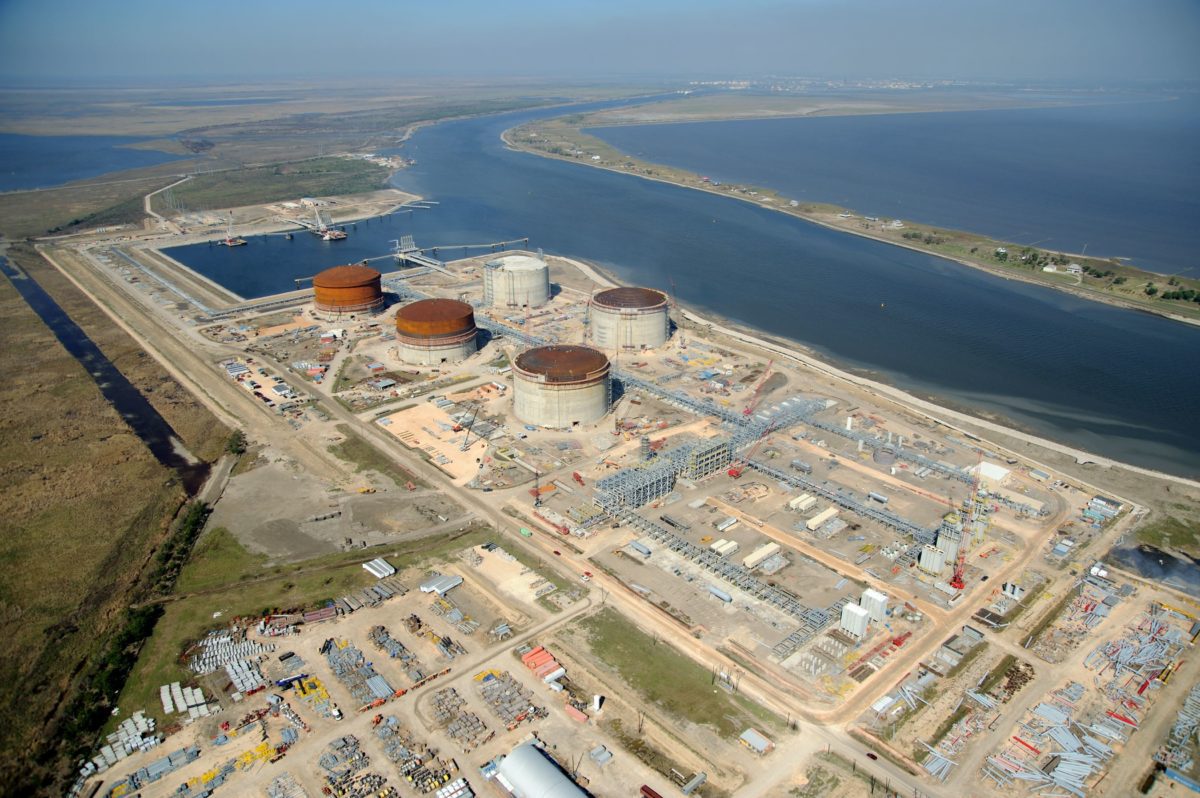Golden Pass LNG Terminal, image courtesy CLIU.org
(Bloomberg) — As the U.S. sets records for natural gas production, the specter of shortages and surging prices has been replaced by a debate over how much to sell overseas. The bounty has fueled speculation President Barack Obama is ready to expand exports.
Sending liquefied natural gas to non-U.S. customers, unthinkable a few years ago when demand outstripped supply, is now seen as a way to help U.S. trade and blunt the influence of producers such as Russia and Iran. The Obama administration is reviewing applications for 20 gas export terminals. If all win approval, the facilities could ship the equivalent of 41 percent of total U.S. production this year, according to Energy Department data.
A decision is possible in “weeks and not months,” said David Leiter, president of ML Strategies LLC, a Washington lobbying firm. John Tobola, general counsel for Freeport LNG, said the company expects “action in this quarter” on its bid.
The prospect of exporting gas has alarmed users such as Dow Chemical Co. and triggered a lobbying battle with producers including Exxon Mobil Corp., which want the market to determine how much is sold overseas. Too much gas for export will push up domestic prices, wiping out a competitive advantage U.S. producers have over foreign companies, according to Dow.
Market Psychology
“We still have a psychology about energy that’s based on the very lengthy period of time when America was so dependent on imports that it was creating energy-security issues,” Spencer Abraham, a former U.S. energy secretary who has worked with gas exporters since leaving office, said in an interview. “Nobody would be advocating this if we only had 10 more years of natural gas supplies. The fact is that we have at least a century or more.”
U.S. gas production, which has jumped 28 percent in the past decade, will average a record 69.9 billion cubic feet a day this year, the Energy Department said last week. Output will reach an all-time high for the sixth straight year on the surge coming from shale formations, such as the Marcellus in the Northeast.
Dow says the U.S. has sufficient supplies to send some overseas. Too many exports though could bring back price volatility, as domestic manufacturers and electric utilities compete with foreign customers for the same commodity, said Kevin Kolevar, Dow’s vice president for government affairs and public policy.
Surplus Gas
“We are in a time a surplus, but we’ve seen moments of irrational exuberance before,” Kolevar said in a phone interview. “We need to be thoughtful. With all the evidence we have today, we still could be wrong.”
Cheniere Energy Inc. in April 2012 won federal approval to build a $10 billion natural-gas export terminal in Louisiana, which may start shipping gas in 2015. The department hasn’t set a timetable for the next applications, including Dominion Resources Inc.’s proposal to export from its Cove Point terminal in Maryland, said William Gibbons, a department spokesman.
Liquefied natural gas gets its name because the gas is super-cooled to liquid form so it can be transported on tankers for distribution to markets too distant to be connected to gas fields by pipelines.
Obama Comments
Obama said in a speech in Costa Rica last week that U.S. exports may “facilitate lower costs” for other nations, without indicating whether he would approve additional sales overseas. The Energy Department in December found that natural gas exports would have “net economic benefits” for the U.S.
The analysis was a victory for companies, including Sempra Energy and Dominion Resources, that are seeking permits to build the multibillion-dollar terminals. In addition to gas producers, expanded exports would help makers of steel and cement used to build natural gas wells, according to Michael Levi, a senior fellow at the Council on Foreign Relations and author of “The Power Surge,” which examines the fight over the future of U.S. energy policy.
“I’ve done estimates that suggest that you might be able to net something on the order of a few billion dollars a year from allowing exports,” Levi said on May 3 conference call. “Not anything spectacular, but the economic benefits, the net benefits should be positive.”
Low Prices
Prices for natural gas remain below the level where U.S. based chemical producers would begin losing an advantage over overseas competitors, said Charles Ebinger, an energy analyst at the Brookings Institution, a Washington public policy group.
The spot price for gas in Louisiana on May 10 was $3.90 per million British thermal units, well below $9.81 in the U.K. Japan, the world’s largest gas importer, paid as much as $19.63 in February, data compiled by Bloomberg showed.
“In most markets, they’re competing against products made from oil,” Ebinger said in an interview. “With the price deferential between natural gas and oil, the reality is the price of gas could go up significantly and I don’t think that would adversely affect their competitive position.”
Processing and shipping may add at least $6 to U.S. gas sold overseas, Leiter of ML Strategies said.
“As people have really gotten smarter about this and looked at it they’re realizing that the manufacturing concern, because of the relatively high cost of exporting LNG, just doesn’t stand the test,” Leiter said in an interview. “There’s still a U.S. manufacturing advantage.”
White House
Policy makers are reluctant to quickly approve the applications, said Ebinger, who said he has spoken with officials at the White House and the Energy Department. Natural gas prices are volatile and while new reserves have eased market swings, Obama would pay a political price if prices jumped, even if unrelated to exports, Ebinger said.
“The administration is scared, and with some justification,” Ebinger said. “They are doing a go-slow approach.”
A 2012 Brookings study co-written by Ebinger found that exports would have only a modest impact on domestic prices and on manufacturers that use the fuel. Increased production would settle prices once exports begin, according to an Energy Department study.
“If the market is allowed to operate here it will effectively work to result in the right number being built,” said Abraham, energy secretary during President George W. Bush’s first term and now chairman of The Abraham Group, a consulting firm in Washington that has worked with Cheniere. “Let’s say you artificially were going to limit it to four. Well which four do you pick because you may pick ones that don’t ever get built.”
Some energy lobbyists said they expect the administration to withhold a decision until a new energy secretary is sworn in. That could happen this week after Senate Majority Harry Reid, a Nevada Democrat, said leaders agreed to bring Obama’s choice, Ernest Moniz, to the floor for a vote.
“The White House increasingly views the shale gas boom as a geopolitical opportunity,” said Paul Bledsoe, a former White House energy aide to President Bill Clinton. “We’ve definitely entered a new era.”
– Jim Efstathiou Jr. and Jim Snyder, Copyright 2013 Bloomberg.

 Join The Club
Join The Club











